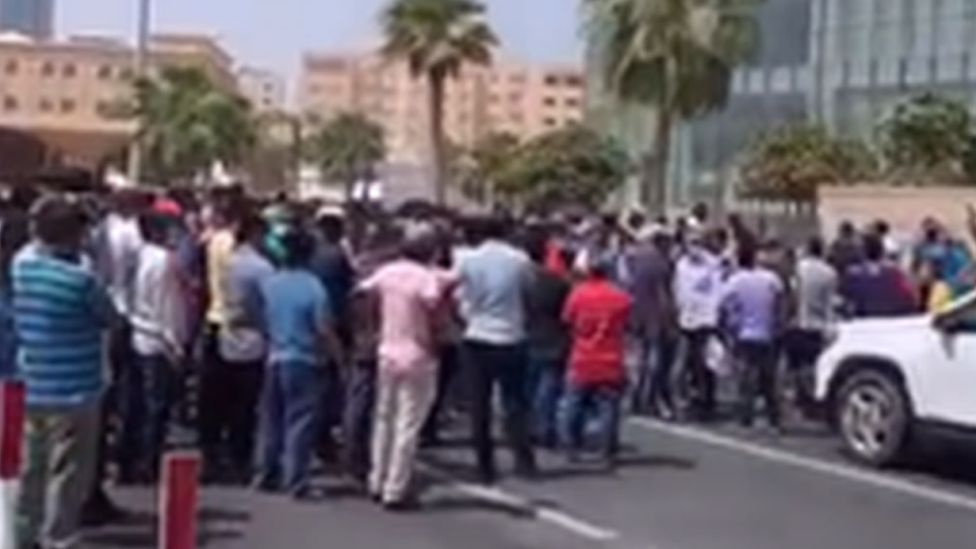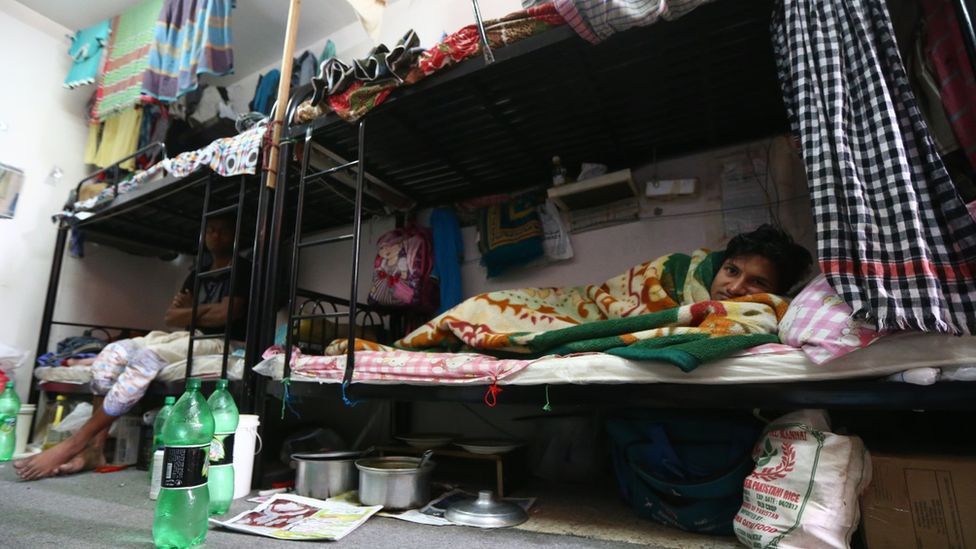Released Date
2022-08-27 | 12:31:00Qatar has deported several foreign labourers who protested about unpaid wages.
Qatar has deported several foreign labourers who protested about unpaid wages. The country is hosting the football World Cup finals this winter, and has employed thousands of foreign workers to build new hotels and facilities. Human rights groups have repeatedly complained about the bad treatment of foreign labourers in Qatar, and the number who have died there.
Qatar has deported several foreign labourers who protested about unpaid wages.
The country is hosting the football World Cup finals this winter, and has employed thousands of foreign workers to build new hotels and facilities.
Human rights groups have repeatedly complained about the bad treatment of foreign labourers in Qatar, and the number who have died there.
How many foreign workers are working on World Cup projects?
Qatar is building seven stadiums for the World Cup finals, a new airport, a new metro system, a series of new roads and about 100 new hotels.
An entire new city is being built around the stadium which will host the final match.
Qatar's government says that 30,000 foreign labourers have been hired just to build the stadiums. Most come from Bangladesh, India, Nepal and the Philippines.
Recently, 60 labourers demonstrated outside the headquarters of the Al Bandary International Group in the capital, Doha, complaining about unpaid wages.
Some workers said they hadn't been paid for seven weeks.
Al Bandary is building dozens of new hotels, malls and residences in Qatar.
A number of protesters were detained and some were deported, although it's not known how many.
The government said those who were deported had "breached security laws".
It added that it was already investigating the company for the late payment of wages.
How are foreign workers treated?
Ever since Qatar won the rights to host the World Cup, in 2010, human rights groups have criticised its treatment of foreign workers.
It said many workers were living in squalid accommodation, were forced to pay huge recruitment fees and had had wages withheld and their passports confiscated.
Since 2017, the government has introduced measures to protect foreign labourers from working in very hot weather, limit their working hours, and improve conditions in workers' camps.
However, in a 2021 report, campaign group Human Rights Watch said that foreign workers were still suffering from "punitive and illegal wage deductions", and faced "months of unpaid wages for long hours of gruelling work".
Qatari companies used to operate a system called "kafala", under which they sponsored foreign workers to come to the country but then prevented them from leaving their jobs.
Under pressure from groups such as the International Labour Organisation (ILO), Qatar's government abolished "kafala", but Amnesty International says companies still put pressure on labourers to stop them switching employers.
It argues this effectively means forced labour still exists in Qatar.
How many foreign workers have died in Qatar?
In February 2021, the Guardian said 6,500 migrant workers from India, Pakistan, Nepal, Bangladesh and Sri Lanka had died in Qatar since it won its World Cup bid.
The number is based on figures provided by the countries' embassies in Qatar.
However, the Qatar government said the total was misleading, because not all the deaths recorded were of people working on World Cup-related projects.
Many of those who died, it said, had been living and working in Qatar for several years, and could have died from old age or another natural cause.
The government said its accident records showed that between 2014 and 2020, there were 37 deaths among labourers at World Cup stadium construction sites, only three of which were "work-related".
However, the ILO believes this is an underestimate, because Qatar doesn't count deaths from heart attacks and respiratory failure as work-related - even though these are common symptoms of heatstroke, brought on from doing heavy labour in very high temperatures.
It has compiled its own figures from government-run hospitals and ambulance services in Qatar, covering work-related deaths and accidents for World Cup projects.
It says 50 foreign labourers died and more than 500 others were seriously injured in Qatar in 2021 alone, and another 37,600 suffered mild to moderate injuries.
BBC Arabic has also gathered evidence which suggests Qatar's government has under-reported deaths amongst foreign labourers.
Life at 50C: Qatar accused of under-reporting deaths in Gulf's killer heat
What does Qatar's government say about foreign workers' rights?
Working in conjunction with the ILO, the Qatari government has recently introduced a number of reforms to labour laws.
These include a wage protection scheme designed to ensure employers pay their staff on time.
A government spokesperson told the BBC its reforms are improving the working conditions of most foreign labourers in Qatar.
"Significant progress to ensure the reforms are effectively enforced has been made," said the spokesperson.
"The number of rule-breaking companies will continue to decline as enforcement measures take hold."
- https://www.bbc.com/news/world-60867042
User Comments
- There is no comment!

